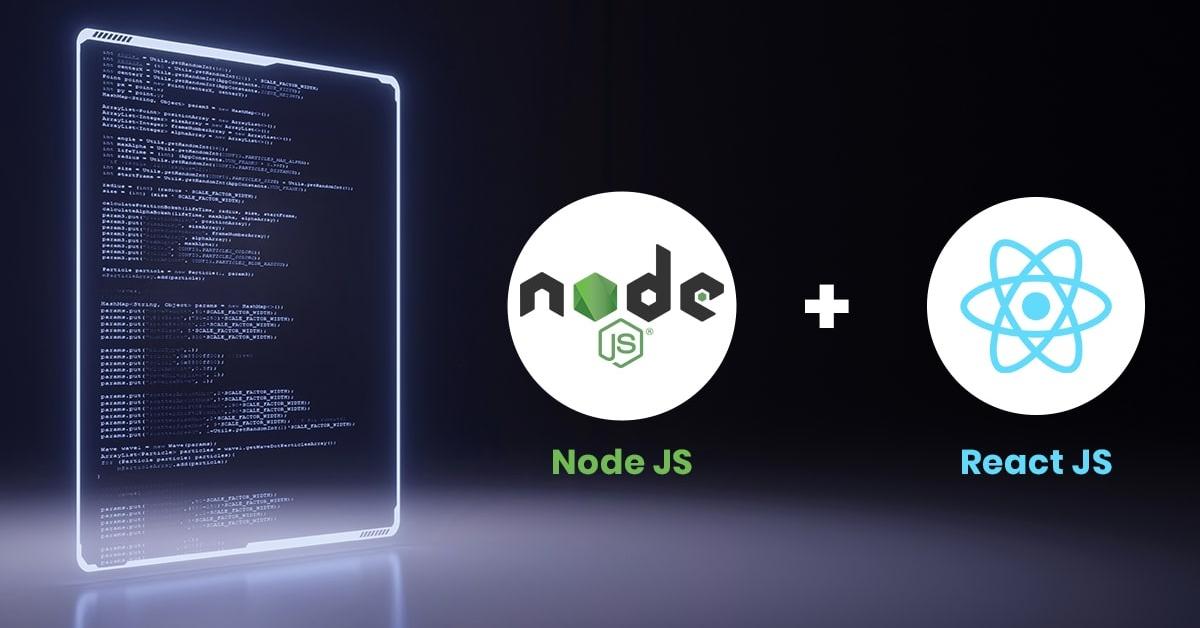The world of web development is ever-evolving, with new technologies and frameworks emerging constantly. Among these, React.js and Node.js have emerged as the go-to choices for building modern, dynamic, and scalable web applications. These two technologies, each with its own strengths, complement each other perfectly, forming a powerful duo for front-end and back-end development.
React.js: The Versatile Front-end Framework
React.js is a JavaScript library for building user interfaces (UIs). It is based on the concept of components, which are reusable pieces of UI code that can be easily composed to create complex interfaces. React’s declarative nature makes it easy to describe how your UI should look, while its virtual DOM (Document Object Model) ensures that updates are rendered efficiently.
Key Benefits of React.js:
- Component-based architecture: React’s component-based approach makes it easy to break down complex UIs into smaller, more manageable pieces, improving code maintainability and reusability.
- Declarative programming: React’s declarative nature enables developers to focus on what the UI should look like, rather than how it should be rendered. This simplifies development and makes it easier to reason about the code.
- Virtual DOM: React’s virtual DOM ensures that only the parts of the UI that need to be updated are actually re-rendered, improving performance and efficiency.
- Large and active community: React has a thriving and supportive community, with a wealth of resources, tutorials, and libraries available to developers.
Node.js: The Versatile Back-end Platform
Node.js is a runtime environment for JavaScript applications running on a server. It uses Google’s V8 JavaScript engine, which allows for efficient and scalable server-side JavaScript execution. Node.js is particularly well-suited for building real-time applications and APIs due to its non-blocking IO (Input/Output) model.
Key Benefits of Node.js:
- JavaScript runtime: Node.js’s JavaScript runtime makes it easy to develop server-side applications using the same language that developers are already familiar with.
- Non-blocking IO: Node.js’s non-blocking IO model enables it to handle multiple requests concurrently, making it ideal for building high-performance applications.
- Large ecosystem of libraries: Node.js boasts a vast ecosystem of libraries and tools, providing developers with a comprehensive set of tools for building various web applications.
- Cross-platform compatibility: Node.js applications can run on various platforms, including Windows, Linux, and macOS, offering greater flexibility.
Combining React.js and Node.js for Unified Development
The combination of React.js and Node.js provides a powerful and flexible stack for building modern web applications. React.js handles the front-end, creating interactive and dynamic user interfaces, while Node.js powers the back-end, handling data processing, API calls, and server-side logic.
This unified approach offers several advantages:
- Single language: Developers can use the same language (JavaScript) for both front-end and back-end development, simplifying the development process and reducing the need for language switching.
- Shared code: Reusable components can be seamlessly shared between the front-end and back-end, promoting code reusability and consistency.
- Improved development workflow: The unified approach streamlines the development process, allowing for faster iteration and deployment.
Hiring React.js and Node.js Developers
When building a web application with React.js and Node.js, it’s crucial to hire experienced developers who are proficient in both technologies. These developers should have a solid understanding of JavaScript, React.js, Node.js, and the principles of web development.
Here are some key qualities to look for when you hire React.js developers:
- Experience with React.js: Experience with React.js is a must-have for React.js developers. Make sure developers have experience developing real-world applications using React.js.
- Knowledge of JavaScript: JavaScript is the primary programming language for React.js developers. Make sure developers have a deep understanding of JavaScript, including object-oriented programming, prototyping, and functions.
- Understanding of front-end development principles: React.js developers should have a deep understanding of front-end development principles, such as component architecture, rendering, and state management.
- Creativity and attention to detail: React.js developers should be creative and detail-oriented. They should be able to create beautiful and functional user interfaces.
- Ability to work in a team: React.js developers should be able to work in a team and communicate effectively with other developers.
Qualities to look for when you hire Node.js developers:
- Experience with Node.js: Experience with Node.js is a must-have for Node.js developers. Make sure developers have experience developing real-world applications using Node.js.
- Knowledge of JavaScript: JavaScript is the primary programming language for Node.js developers. Make sure developers have a deep understanding of JavaScript, including object-oriented programming, prototyping, and functions.
- Understanding of back-end development principles: Node.js developers should have a deep understanding of back-end development principles, such as architecture, security, and scalability.
- Ability to work with databases: Node.js developers should be able to work with databases, such as MySQL, PostgreSQL, and MongoDB.
- Ability to work with APIs: Node.js developers should be able to work with APIs, such as REST and SOAP.
Additional qualities that may be important for both categories of developers:
- Key skills: Make sure developers have the necessary key skills, such as Git, testing, and DevOps.
- Education: Make sure developers have a quality education, such as a degree in computer science.
- Certifications: Make sure developers have the necessary certifications, such as certifications from React.js and Node.js.
When making a decision about hiring React.js or Node.js developers, it is important to consider the specific needs of your project. However, possessing these key qualities will enable developers to create high-quality, scalable, and performant software.
